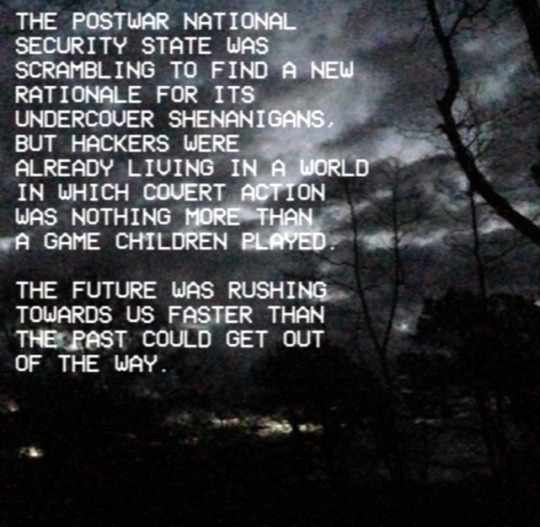#Wiretapping
Explore tagged Tumblr posts
Photo

Wiretapping
Artist: Jason A. Engle TCG Player Link Scryfall Link EDHREC Link
31 notes
·
View notes
Text
Hugo Lowell at The Guardian:
Days before Pete Hegseth fired three top aides last month over a Pentagon leak investigation into the disclosure of classified materials, according to four people familiar with the episode, a recently hired senior adviser said he could help with the inquiry. The adviser, Justin Fulcher, suggested to Hegseth’s then chief of staff, Joe Kasper, and Hegseth’s personal lawyer, Tim Parlatore, that he knew of warrantless surveillance conducted by the National Security Agency (NSA) that had identified the leakers. Fulcher offered to share the supposed evidence as long as he could help run the investigation, three of the people said. But when he eventually sat down with officials, it became clear he had no evidence of a wiretap, and the Pentagon had been duped. The problem was that development was not communicated to the White House – so several Trump advisers who were told of the NSA wiretap claim believed that was part of the “smoking gun” evidence against the three aides fired by Hegseth, until they developed their own doubts. The Guardian revealed last month that there were unsubstantiated NSA warrantless wiretap claims underpinning the leak investigation, but its origin story and the involvement of Fulcher in the controversy has not been previously reported. Fulcher has said this account is not correct. In a statement, he said he never suggested there were NSA wiretaps or that he had access to wiretap records. “I never approached Parlatore, Kasper or anyone else offering ‘surveillance evidence’ and did not ask to join an investigation on that or any other basis,” he said. The extraordinary episode adds to the growing portrait of dysfunction inside Hegseth’s front office, which is involved in setting the direction of a department that has a budget of nearly $1tn and oversees more than 2 million troops around the world. The investigation prompted Hegseth to fire his senior adviser Dan Caldwell, the deputy chief, Darin Selnick, and the deputy secretary’s chief of staff, Colin Carroll, creating a leadership vacuum filled by Ricky Buria, the ex-junior military aide to Hegseth considered by the White House to be a liability.
The Guardian has a report on how Justin Fulcher, an aide for the embattled Pete Hegseth, helped upend a Pentagon leak inquiry.
#Pete Hegseth#Justin Fulcher#DOGE#Wiretapping#Tim Parlatore#National Security Agency#NSA#Joe Kasper#Colin Carroll#Darin Selnick#Dan Caldwell#Ricky Buria
11 notes
·
View notes
Text

text from CYBERThrash (1990) by Julian Dibbell
61 notes
·
View notes
Text
Jean Seberg
Strikingly, my experiences reflect historical situations, revealing connections between me being a target and the lessons of the past.

Jean Seberg was an American actress who became a notable target of the FBI due to her political activism, especially her support for the Black Panther Party and other civil rights causes in the 1960s and 1970s. Seberg was famous for her roles in films such as Breathless and Saint Joan, but her involvement in left-wing political activities made her a subject of the FBI’s COINTELPRO (Counterintelligence Program), which was designed to surveil, discredit, and neutralize political activists deemed subversive. The FBI viewed Seberg’s activism, particularly her financial contributions to the Black Panthers, as dangerous. To undermine her reputation, the FBI orchestrated a smear campaign against her. One of the most infamous actions taken by the Bureau was planting a false story in the media suggesting that Seberg was pregnant with the child of a Black Panther leader. The aim was to destroy her public image and personal life.
Jean Seberg’s persecution by the FBI included more than just the smear campaign. Her house was broken into multiple times, and her phones were tapped as part of the broader surveillance and harassment under COINTELPRO. These invasive tactics were aimed at keeping tabs on her activities, particularly her support for civil rights organizations like the Black Panthers. The FBI’s break-ins, or “black-bag jobs,” were illegal entries into her home, part of their effort to gather information and intimidate her. Tapping her phones allowed the FBI to monitor her communications, further violating her privacy and contributing to the relentless harassment she endured. These measures were part of the FBI’s broader efforts to neutralize her as a public figure and an activist.
Jean Seberg’s story resonates with me on a personal level, particularly because of the burglaries and the invasive surveillance she endured. Like Seberg, I’ve experienced burglaries and hacking, and there were many times when I encountered suspicious individuals who seemed to know things about my past — details of my youth and young adult life that I rarely shared. Seberg’s ordeal highlights how deeply personal and invasive such tactics can be, also in how it affects one’s sense of safety, privacy and mental health.
If Jean Seberg took her life due to the psychological pressure and public humiliation, then one would think that tenant group, a group who claims to be revolutionary, who some had known me for almost 10 years, would understand, but they say they didn’t and didn’t even acknowledge what happened and how much of an impact it had on me.
They appeared to almost conflate some type of invincibility with me based on how they perceived me in their minds. Despite our long acquaintance, they never truly understood who I was. It was an operation meant to destabilize every aspect of my life, and because I did not live up to their expectations, they targeted me further when I tried to continue with organizing them.
It really was one of the biggest mistakes I ever made in my adult life to even think of organizing with them or anyone, or if thinking they would even care what happened to me, whether or not the battle scars were physical or mental.
2 notes
·
View notes
Text
so my intrusive thoughts fueled by OCD, PPD, SZTPD and generational trauma were right to be afraid of FEDex gotcha
#safety#anti colonial#anti imperialist#ai technology#spyware#trigger warning for people with paranoia#US government#wiretapping#surveillance#Black Indigenous liberation#Black and Brown issues#working class#indigenous#two spirit#native#indio politics#land back
4 notes
·
View notes
Text
"Dictatorship is power based directly upon force and unrestricted by any laws."

John Edgar Hoover was an American attorney and law enforcement administrator who served as the fifth and final director of the Bureau of Investigation and the first director of the Federal Bureau of Investigation. Wikipedia
Born: 1 January 1895, Washington, D.C., United States
Died: 2 May 1972 (age 77 years), Washington, D.C., United States
He had no birth certificate until he was 43 – Hoover was born on January 1, 1895, but his birth certificate wasn’t filed until 1938, the year his mother passed away.
His childhood nickname was "Speed" – The origins of this nickname are unclear, but some say it was because he learned to speak quickly to overcome a stutter, while others claim it was due to his fast grocery deliveries.
He helped modernize crime-fighting – Hoover introduced fingerprint databases, forensic labs, and rigorous training for FBI agents, making the Bureau more professional and scientific.
He ran the Bureau of Investigation’s Radical Division at just 24 – Hoover was put in charge of monitoring domestic radicals and led the infamous Palmer Raids, which targeted leftist immigrants.
He kept his personal life extremely private – Despite wielding immense power, Hoover was secretive about his own life, fueling speculation about his background and personal relationships.
#FBI Director#Law Enforcement#Espionage#Surveillance#Cold War#Crime Fighting#Political Influence#Hoover Files#Secretive#Controversial#Intelligence Gathering#Anti-Communism#Wiretapping#Federal Bureau of Investigation#Clyde Tolson#Public Safety#Organized Crime#Civil Rights Movement#Power and Control#Historical Figure#quoteoftheday#today on tumblr
0 notes
Text
Website Use of Third-Party Tracking Software Not Prohibited Under Massachusetts Wiretap Act
The Supreme Judicial Court of Massachusetts, the state’s highest appellate court, recently held that website operators’ use of third-party tracking software, including Meta Pixel and Google Analytics, is not prohibited under the state’s Wiretap Act. The decision arose out of an action brought against two hospitals for alleged violations of the Massachusetts Wiretap Act. The complaint alleged that…
0 notes
Text
RFK Jr. defends FBI, Kennedy-era wiretapping of MLK Jr.
1 note
·
View note
Text
youtube
0 notes
Text

ASTRO 🌐
2K notes
·
View notes
Text



ARE YOU FUCKING SERIOUS ?
#sev.screams#arlecchino#THREE DAYS ?? THREE DAYS ???#hoyo wiretapped me wtf#so in tune w the husband i accidentally manifested her merch she loves me fr
150 notes
·
View notes
Text
Olivia Troye at Olivia Of Troye Unfiltered:
While Trump's tariffs hammer the economy and dominate the headlines, rightfully capturing attention as Americans watch their 401ks drop, something perilous quietly unfolded in the shadows. A significant shift in the national security apparatus occurred that barely made a blip. It hardly registered in the mainstream news cycle late last week when General Timothy Haugh was ignominiously removed as dual-hatted Director of the National Security Agency (NSA) and Commander of U.S. Cyber Command. Perhaps in the chaos of Trump 2.0, another outstanding leader being ousted is just business as usual. For the ones that did mention it, they pointed out that the action could seriously hurt America’s cyber defenses and make it a lot easier for foreign adversaries to strike our networks. They’re correct. But let me be even clearer about what’s not being talked about: this is not just another reshuffling of power—it's a five-alarm fire for anyone who values their privacy and civil liberties. And it wasn't just Haugh who was shown the door. Wendy Noble, the highly respected civilian Deputy Director of the NSA, was also reassigned back to the Department of Defense. This wasn't just a firing but a purge of institutional memory, experience, and moral backbone. Tim Haugh wasn't just any flag officer. He was beloved by his workforce, respected by national security professionals across the political spectrum, and known as much for his integrity and superb leadership skills as for his mission expertise. Haugh's departure leaves a void in one of the most sensitive and consequential roles in government. Whoever fills that vacuum could alter the trajectory of one of our most fundamental American freedoms: the right to privacy.
A Role That Holds Enormous Power
By long-standing tradition, the NSA is led by a uniformed military officer, while the deputy is a civilian. That balance matters. It provides both continuity and civilian oversight of a powerful institution with the ability to monitor global communications—and, yes, potentially, American citizens. Tim Haugh upheld that legacy of integrity. Similarly, with her deep expertise and decades of experience, Wendy Noble brought the kind of institutional knowledge and civilian leadership that protected that balance. But now, with both Haugh and Noble removed in quick succession, we're in uncharted territory. The critical safeguards that these respected leaders maintained have been dismantled, and the Trump administration has shown us what it's capable of when unchecked power meets authoritarian instinct. [...]
Why You Should Care: FISA Section 702
One of the most potent surveillance tools in the national security toolbox is Section 702 of the Foreign Intelligence Surveillance Act (FISA). Section 702 allows the NSA and FBI to collect foreign intelligence by targeting non-U.S. persons outside the country. Sounds reasonable on paper. It's a powerful and necessary tool to protect national security—used to thwart terrorists, identify foreign cyber actors, and uncover threats to U.S. interests. But here's the catch: in the course of collecting this foreign data, U.S. persons' communications are often swept up. That's where the controversy begins. This is where procedures, leadership, and the integrity of institutions matter. As a former commander of multiple Air Force and joint intelligence organizations responsible for signals collection, Tim Haugh knew how to protect Americans’ privacy. Yet while 702 is designed to protect us, it can also be exploited to monitor Americans on U.S. soil. Without proper safeguards, it can become a backdoor to domestic surveillance. I've seen the inner workings of this system, and I can tell you that it works when principled leaders are at the helm. But in the wrong hands? It's terrifying.
Remember Trump's Obsession with Wiretaps? Let me remind you of a key moment in Trump's first term. He falsely accused President Obama of wiretapping Trump Tower. It was a baseless claim, thoroughly debunked—even his own Justice Department and the intelligence community found nothing. But Trump's tactic wasn't random. It was a classic projection. Because behind the scenes, while I was working in the White House, very real and deeply disturbing conversations were happening. Trump wanted the Department of Justice to authorize surveillance of personal devices of people he deemed political enemies or leakers. It wasn't paranoia; it was authoritarian yearning. And it was chilling. So when I see Tim Haugh forced out, Wendy Noble removed, Pam Bondi at the helm of the Department of Justice, and Kash Patel—who is currently the Director of the FBI—calling the shots, that's not just concerning. That's a massive, flashing red warning light for the nation. [...]
This Is Bigger Than One Leader
This isn't just about Tim Haugh or Wendy Noble. It's about a pattern of purging competent, principled leaders and replacing them with loyalists who will enthusiastically comply with any order or request, no matter how anathema to our democracy. It's about dismantling the apolitical fabric of our national security institutions. It's about the slow, quiet erosion of freedoms that most Americans assume are protected until they’re not.
The firing of Tim Haugh and the reassigning of Wendy Noble is a major red flag alert for national security.
#Gen. Tim Haugh#US Military#Trump Regime#National Security Agency#US Cyber Command#National Security#Wendy Noble#FISA#Section 702#Trump Tower#Wiretapping#Trump Tower Wiretapping#Kash Patel#Tulsi Gabbard
15 notes
·
View notes
Text
“[insert ship name] shippers where you at?”
and it’s the most obscure rarepair you’ve ever seen with one character that’s like dead and the other one doesn’t even know the dead one exists
#ii#inanimate insanity#osc#object show comunity#object show#bfdi#bfb#tpot#hfjone#shipping#fandom#this is abt wiretap#ghhhh#toilet x mephone 4s
90 notes
·
View notes
Text

wiretaps ref has been updated again LOL
#my art#tf#maccadams#tfsona#tf oc#tf oc art#transformers art#transformers#transformers oc#transformers sona#wiretap
23 notes
·
View notes
Text


Wiretap walked into the wrong neighborhood….
(Was too lazy to add a background-)
Full page below

#tfp#minicon#transformers#transformers prime#soundwave#tfp soundwave#tf oc art#tf oc#transformers oc#wiretap
35 notes
·
View notes
Text
A friend sent me this a while ago. I found it funny, and thought I'd post it here. I was never romantic or intimate with Nixon, but if he's out there somewhere I can't say I'd be opposed to some rivals-to-lovers.. ;) I would love to see his "water gate," if you know what I mean. And I love Fall Out Boy!
#as long as he doesn't wiretap me !#I dont know what thats a euphemism for...#im trying to be funny ok#reincarnation#reincarnationblr#jfk assassination#richard nixon#enemies to lovers#rivals to lovers#romance#mlm yearning#bisexual#bisexual pride#fall out boy#petekey#bandom#fob#presidentblogging
23 notes
·
View notes